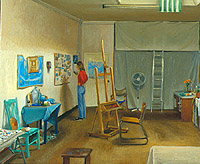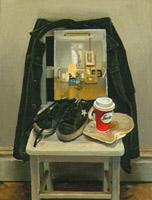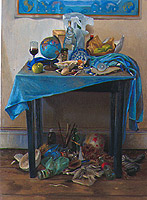- Richard
Gunning's paintings
reveal an intense interest in the aesthetic possibilities of the interior
spaces of studio and home. Focus is upon the value and integrity of
ordinary objects within these settings - a shoe, ladder, chair, fruit,
flowers. In the works (whether scrutinising a few objects or an entire
room) concentration is upon variety of surface texture and compositional
balance, aided by the unifying (and often dramatic) effects of colour
and light.

Studio
Visit 1999
Oil on Linen
50.5 x 60.5 cm
(Collection - BankWest)
|

White
Chair with Painting 1999
Oil on Linen
45.5 x 35 cm
(Private Collection)
|
- Beyond
an exposition of technical virtuosity, these paintings suggest a considerable
interest in the nature of illusion and construction of the visible
world in painting. The various images of Gunning's studio interior
can be read as a series which moves between concurrent desires to
reveal and conceal. The Studio Visit (1999) depicts a wide
view of the artist's workspace, detailed and partially reorganised
aspects of which are presented in other works. In the space of the
studio objects are exposed in varying states - doors are left open
and closed, a mirror reflects other aspects of the room, fabric swathes
table and chairs, and curtains are pushed back to glimpse a world
outside - so that what is not revealed in one work might be understood
in another. Renderings of existing studio paintings also appear as
objects within particular works. In White Chair with Painting (1999)
the microcosmic world of a still life with chair, jacket, sneakers,
take-away coffee cup and shell is combined with a studio interior
study propped upon the shoes, revealing aspects of the larger environment
in which the objects in the painting 'reside'.
|
Studio
Interior1999
Oil on Canvas
30.5 x 22.5 cm(Private
Collection)
|
Window
with Easel 2000105
x 62 cmOil
on linen(City
of Wanneroo Collection)
|
- Gunning's
work continually oscillates between an austerity and economy in the
use of objects (Chair with Peach Painting, 1999) and almost
exaggerated combinations of the ephemera of everyday life (The
Blue Table, 1998). The abundance of items collected in the latter
image is almost a parody of the Dutch still life tradition in which
objects appear delicately balanced just prior (it seems) to their
inevitable disintegration. The potentially chaotic effects of such
an assortment is, however, entirely avoided as disparate elements
are unified through the use of strong colour and dramatic lighting.
Concentration upon the effects of light also transforms this amalgam
into a group of objects with significant aesthetic value, to be approached
with some reverie.
|
Chair
with Peach Painting Study1999
Oil on Paper
34 x 21.5 cm
(Private Collection)
|

The
Blue Table1998
Oil on Linen
122 x 91 cm(Private
Collection)
|
- Although
the artist does not present himself in these studio and domestic interiors,
his presence is consistently inferred in the precious objects revealed
and spaces inhabited daily. This adds a highly imaginative dimension
to the viewer's act of looking. Narratives within and without the
picture frame are suggested despite an almost absolute lack of human
presence in the works. When a figure is added (as in the Studio
Visit, 1999) the individual is shown as thoroughly absorbed with
pictures on a pin board. Her presence does not deflect from the real
action of the picture - rather it mirrors the position of the viewer,
whose gaze is similarly concentrated upon the intense variety of objects
depicted and the meanings they evoke.
|
Still-Life
with Plums1998
Oil on Canvas
50 x 39.5 cm(Private
Collection)
|
46
Victoria Avenue 1995Oil
on Screen Panels165
x 165 cm
(Private
Collection)
|
|